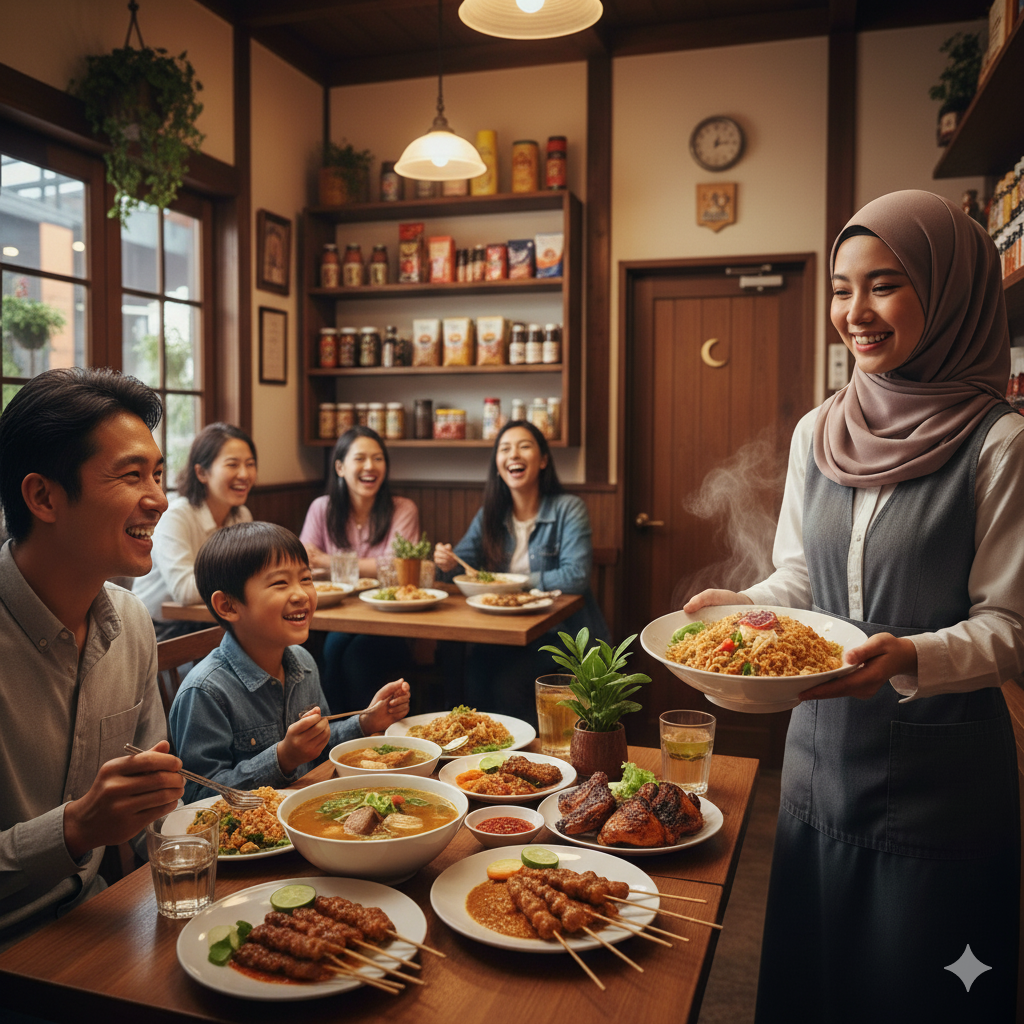Where to Find Authentic Halal Indonesian Cuisine in Tokyo and Osaka

For Muslim travelers visiting Japan, the craving for the rich, aromatic spices of authentic Indonesian cuisine, from a classic Nasi Goreng to a slow-cooked Rendang, is a common experience. Fortunately, as Japan continues to expand its Muslim-friendly tourism options, the major cities of Tokyo and Osaka now feature excellent, certified, and friendly Indonesian dining choices, guaranteeing a delicious and worry-free meal.
Tokyo: A Vibrant Hub for Southeast Asian Flavors
Thanks to its large and diverse expatriate community, Tokyo offers numerous Indonesian eateries, many of which consciously adhere to Muslim dietary needs.
Top Halal Indonesian Restaurants in Tokyo
The Cinta Jawa Cafe chain is perhaps the most widely recognized and accessible option, with branches located conveniently in high-traffic areas like Shinjuku, Akihabara, and Shibuya. This café specializes in authentic, home-style Javanese cooking. Their popular dishes include Bebek Goreng (Fried Duck) and various comforting Nasi Goreng preparations. While the chain is generally considered Muslim-Friendly, guests should always confirm the Halal status directly upon arrival.
If you prefer intensely seasoned and spicy food, check out Indonesian Restaurant Cabe (Cabe means chili) in the Meguro district. This restaurant is highly regarded for its authentically spicy and flavorful dishes, including many favorites from Padang cuisine. It is a reliable Muslim-friendly spot that truly captures Indonesia's distinct spice profiles.
Travelers looking for essential ingredients or quick meals should stop by Toko Indonesia in Okubo, Shinjuku. While primarily a grocery store stocking Halal Indonesian products (such as instant noodles, snacks, and spices), these shops often sell simple, pre-cooked traditional meals, making them ideal for an authentic Halal lunch on the go. The entire Okubo and Shin-Okubo area is known as a welcoming, multicultural hub with many Halal Asian dining choices.
Osaka: Certified Halal Dining in the Kansai Region
Osaka offers a focused selection of highly-rated Indonesian venues, often providing clear Halal certification and dedicated facilities for maximum traveler convenience.
Reliable Halal Indonesian Spots in Osaka
One of the most highly recommended locations is Cafe Bintang, situated centrally in Shinsaibashi. Cafe Bintang provides exceptional Halal assurance and service for Muslim visitors. It specializes in Javanese-style cuisine, a refreshing alternative to the more common Balinese menus. Crucially, the establishment confirms it is Halal certified and features a dedicated prayer room, ensuring total peace of mind. Signature dishes include Sup Buntut (Oxtail Soup) and their specialty Nasi Goreng.
Another excellent choice near major transportation hubs is Asian Restaurant Apakabar (meaning "What's up?"), located near Osaka/Umeda Station. This restaurant offers a diverse menu with a strong focus on Indonesian classics. They confidently assure customers that all food on the menu is Halal. You'll find popular options like Rendang Sapi (Beef Rendang) and Sate Kambing (Goat Skewers). Like Cafe Bintang, Apakabar is known for having a dedicated prayer space.
For authentic local flavors, Bagus Indonesian Kitchen in Nakatsu is well-regarded among Indonesian residents. While the flavors are authentic Javanese, always exercise caution with uncertified international restaurants: it's highly recommended to confirm with the staff about the source of meat and cooking oils to ensure they meet your personal Halal standards.
Essential Halal Verification for International Travelers
When dining in Japan, understanding the distinction between terms is key to a worry-free meal:
"Halal Certified": This is the highest level of assurance. It means the restaurant has been formally verified by a recognized Japanese Halal organization, ensuring that all ingredients, preparation methods, and equipment comply with Islamic law.
"Muslim-Friendly" / "No Pork & No Alcohol": This indicates the restaurant intentionally avoids using pork and alcoholic products in its preparation. However, it may not have a fully segregated kitchen or official certification.
To ensure your peace of mind, always prioritize venues labeled as "Halal Certified". If the status is Muslim-Friendly, simply be ready to ask the staff directly: "Is this Halal?" or "Does this contain any alcohol or meat extract?" before ordering.
What authentic Indonesian dish are you most excited to try on your trip to Japan?



